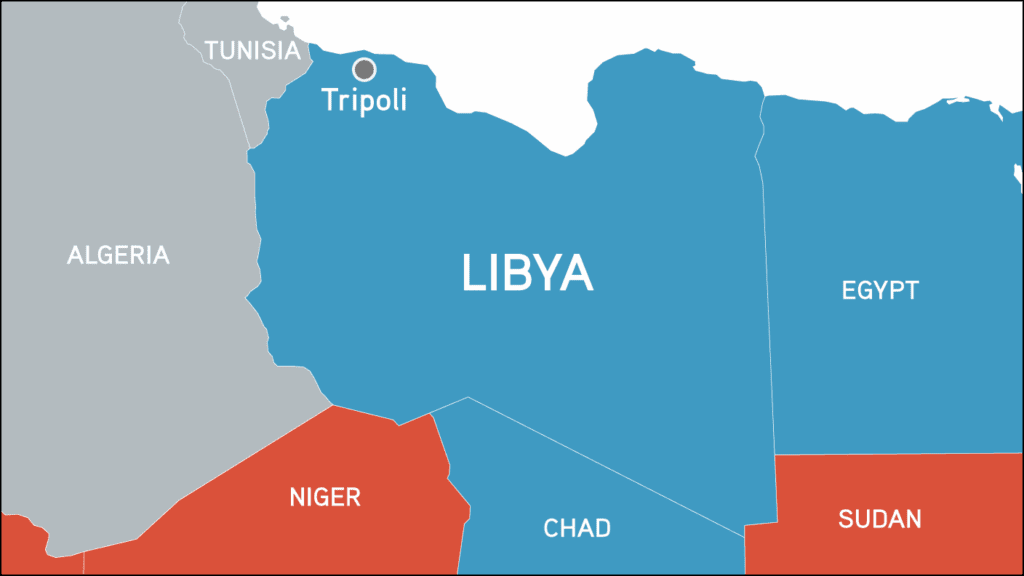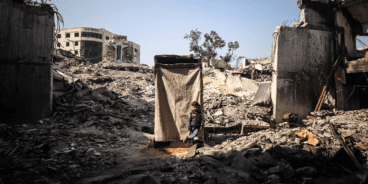Libya

Civilians in Libya faced war crimes and crimes against humanity as a result of fighting between rival armed groups and competing governmental authorities from 2011-2020.
BACKGROUND:
In response to a popular uprising during February 2011, the Libyan government, led by Muammar Qaddafi, initiated a violent crackdown. An estimated 500-700 civilians were killed over several weeks as the Libyan government deployed the military and used tanks against civilians and rebel forces in the besieged cities of Benghazi, Misrata and elsewhere. In response to these attacks the UN Security Council (UNSC) adopted resolutions 1970 and 1973, invoking the Responsibility to Protect, authorizing the use of force to protect populations. Subsequently, a NATO-led alliance conducted air strikes against military targets that posed a severe threat to civilians. After several months of intense fighting, Tripoli fell to the rebels and the Qaddafi government collapsed in August 2011.
Since the overthrow of Qaddafi’s government, transitional governing bodies have failed to restore stability to the country and multiple UN-facilitated peace processes have stalled. Throughout Libya’s conflicts, armed militias have committed extrajudicial killings, torture, abductions and have indiscriminately attacked civilian areas. Nearly a decade of fighting left over 270,000 people internally displaced and 900,000 in need of humanitarian assistance.
In April 2019 former senior military officer, Khalifa Haftar, and his self-proclaimed Libyan Arab Armed Forces (LAAF), launched an offensive to seize control of the country from the UN-backed Government of National Accord (GNA) based in Tripoli. The fighting displaced 250,000 people and resulted in at least 430 civilian casualties. Following intense clashes, the GNA, with Turkish support, pushed the LAAF out of Tripoli on 4 June 2020. The GNA subsequently discovered mass graves in areas retaken from the LAAF and allied militias around Tarhuna and Tripoli. During the offensive armed groups on all sides violated International Humanitarian Law (IHL) and International Human Rights Law (IHRL).
During October 2021 the UN Human Rights Council (HRC)-mandated Fact-Finding Mission (FFM) on Libya released its first report, alleging that war crimes and crimes against humanity have been committed in Libya since 2016. Violations include murder, torture, enslavement, extrajudicial killings and rape.
On 23 October 2020, following four rounds of talks, delegations to the 5+5 Joint Military Commission (JMC) signed a permanent, countrywide ceasefire. On 26 October the Libyan Political Dialogue Forum was relaunched by the UN Support Mission in Libya (UNSMIL). On 10 March 2021 the Government of National Unity (GNU) was formed to lead the country until elections slated for December 2021.
Militias continue to facilitate human trafficking and the enslavement of migrants and asylum seekers attempting to cross the Mediterranean Sea to Europe. The FFM stated that violations against the thousands of migrants in Libya may amount to crimes against humanity.
ANALYSIS:
While the conflict in Libya was presented as a battle between secular, moderate forces and their extremist Islamist rivals, in reality it was dominated by shifting personal, tribal and regional enmities and alliances. The involvement of international forces significantly prolonged the conflict and made it more intractable.
Armed groups on all sides have violated IHL and IHRL. UNSMIL has determined that some LAAF airstrikes may amount to war crimes. There is also evidence that states, including permanent members of the UNSC, have provided arms and personnel to parties to the conflict despite a UN-mandated embargo.
INTERNATIONAL RESPONSE:
The International Criminal Court (ICC) has multiple outstanding arrest warrants for individuals accused of war crimes and crimes against humanity in Libya since 2011. During June 2011 the ICC issued arrest warrants for Muammar Qaddafi, Saif al-Islam Qaddafi, Al-Tuhamy Mohamed Khaled, former head of the Libyan Internal Security Agency, and Abdullah al-Senussi, former head of military intelligence, for the alleged commission of war crimes and crimes against humanity. On 15 August 2017 the Court issued an arrest warrant for Major Mahmoud Mustafa Busayf al-Werfalli of the LAAF for alleged war crimes, but he was subsequently killed.
On 7 June 2018 the UNSC imposed targeted sanctions on six individuals accused of people smuggling in Libya.
On 22 June 2020 the HRC established the FFM to investigate the human rights situation and document alleged abuses in Libya since 2016. On 4 October the HRC extended the mandate of the FFM for nine months.
On 12 March 2021 the UNSC welcomed the formation of the GNU and called for the immediate withdrawal of the estimated 20,000 foreign and mercenary forces in line with the UNSC-mandated arms embargo.
NECESSARY ACTION:
All states supplying arms and personnel in violation of the UNSC-mandated arms embargo should cease these violations immediately.
All those responsible for mass atrocities in Libya, both past and present, should be held accountable for their crimes.
Atrocity Alert No. 413: Israel and the Occupied Palestinian Territory, DR Congo and Libya
Atrocity Alert No. 340: Libya, North Korea and Ethiopia
Atrocity Alert No. 315: Ethiopia, Libya and International Day of the Victims of Enforced Disappearances
Atrocity Alert No. 310: Myanmar (Burma), Afghanistan and Libya
Related Content

Recommendations for the 50th Session of the Universal Periodic Review

Atrocity Alert No. 443: Sudan, Israel and the Occupied Palestinian Territory and United States Travel Ban
